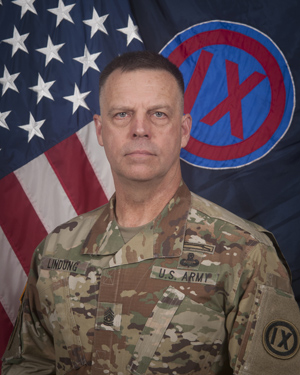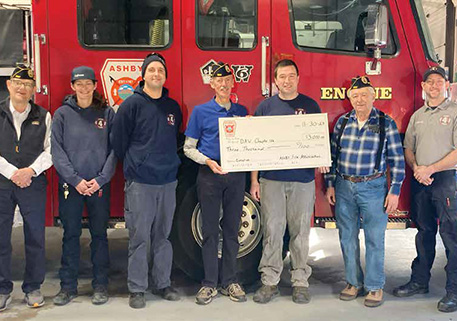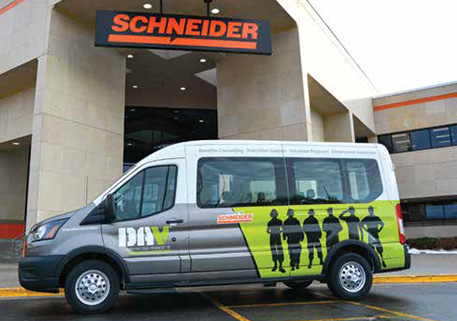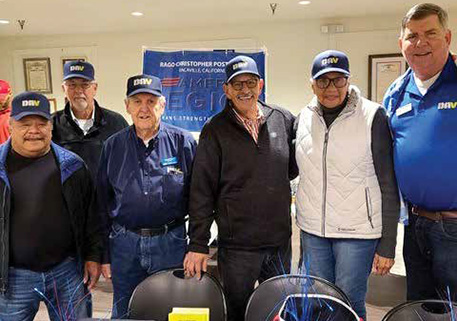 Army veteran turns to former barracks roommate, DAV service officer for help with VA claim
Army veteran turns to former barracks roommate, DAV service officer for help with VA claim
The jump was anything but routine. The air was frigid, and visibility was next to zero in the pitch-black night.
As paratroopers began to descend onto the tiny drop zone in northern California, equipped with full combat gear, the frozen ground beneath came quicker than expected. Christopher Lindung—an experienced paratrooper—landed with such force that he immediately fell back upon a harsh landing, fracturing his tail bone and left wrist, as well as suffering a concussion.
That airborne accident, which occurred in 2000, was just one of the many jumps Lindung conducted in his 34 years of service, both on active duty and in the Army Reserve.
“I have arthritis in every joint, and I’ve had multiple concussions,” Lindung said. “It took a toll.”
When the time came for him to finally hang up his jump boots and retire from the military 18 years later, one person stuck out who Lindung knew he could count on—his former barracks roommate and DAV National Service Officer Randy Bunting.
Bunting remembers Lindung as “a soldier’s soldier,” earning the expert infantryman badge and graduating from jumpmaster school. The two became friends while assigned to the same company in the 82nd Airborne Division. They went separate ways after a few years. When Lindung left active duty in 1988, he went straight into the Army Reserve. Bunting continued to serve both on active duty and in the South Carolina and Illinois National Guard before joining DAV’s professional ranks.
Lindung, a supervisory special agent with the Department of Homeland Security in San Diego, spent the rest of his military career assigned to 12th Special Forces Group, psychological operations and civil affairs units in the Army Reserve. He remained on active jump status even after reaching the rank of command sergeant major. He deployed to Haiti under Operation Uphold Democracy in 1995, took part in the invasion of Iraq in 2003 and served during Operation New Dawn in Iraq in 2011.
Years passed before Lindung and Bunting crossed paths again. In 2014, Bunting traveled to San Diego, where the two airborne soldiers caught up and reminisced about their time in the 82nd. A few years later, Bunting, the assistant supervisor of the DAV national service office in Louisville, Ky., reached out to his former roommate as his retirement date approached, knowing full well how complicated applying for VA benefits can be.
“I sparked the conversation in 2016,” said Bunting. “He was still a little bit away from retiring, so I told him when he’s ready, DAV will be there to help him out.”
Not only was Bunting a familiar face, Lindung saw firsthand how DAV helped his wife, Elizabeth, a Naval Academy graduate, with her VA claim in 1995. Despite being more than 2,000 miles away, Bunting was able to guide his friend through what can be an exceptionally daunting process, mostly through email and the occasional phone call.
“You’re used to dealing with folks in your home state,” said Bunting, “but I’ve had people from all over the country contact me.”
DAV service officers can assist veterans not only in their local areas but also nationwide.
“I went to the VA, and all they did was throw some paperwork at me and told me to fill it out,” added Lindung. “Randy explained everything I needed to do.”
Bunting submitted a VA claim on Lindung’s behalf for a number of service-connected ailments in August 2017— a year before he retired. Approval for that claim came in May 2018, which covered a range of injuries to his shoulders, wrists, hip, knee and hearing. The following month, the VA also granted service connection for headaches.
Although he’s an Army man, Lindung retired in August 2018, standing on the deck of the USS Midway, a historic aircraft carrier museum in San Diego.
Lindung would enlist DAV’s help again in November that year, seeking service-connection for injuries to his right ankle and hip, which, similar to his other wounds, came from years of parachute training.
While the duo had not been physically close to each other in years, Lindung said the process was straightforward, and DAV provided some much-needed personal relief.
“I was pleasantly surprised,” he said. “This is compensation for damaging my body over the years. When you sign on the dotted line, you expect to be taken care of.”






